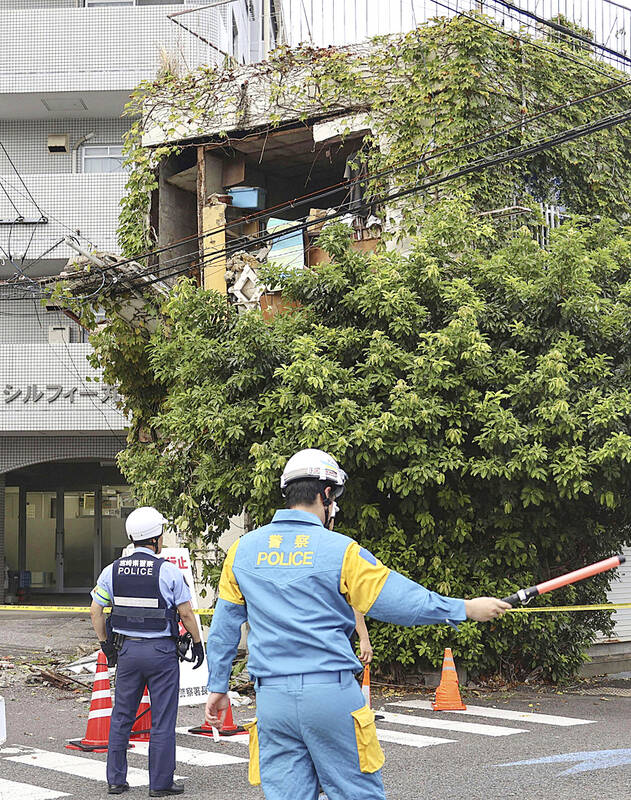A powerful earthquake with a magnitude of 7.1 shook southern Japan yesterday, but no major damage was reported and only relatively minor tsunami arrived at the coast.
The quake hit at 4:42pm off Kyushu at a depth of 25km, the US Geological Survey said.
Broadcaster NHK showed footage of traffic lights shaking violently in Miyazaki on Kyushu.

Photo: AP
“The surface of the sea is wavering. I felt an intense jolt when the quake happened which lasted for between 30 seconds and a minute,” a local official told NHK.
The broadcaster also reported that three people were hurt in Miyazaki, but gave no indication of the extent of their injuries.
Tsunamis of up to 1m were initially expected to arrive or had arrived in some coastal areas in Kyushu and Shikoku islands, the Japan Meteorological Agency said.
The agency also said a small tsunami was possible in Chiba, about 850km from the epicenter.
“Tsunamis will strike repeatedly. Please do not enter the sea or approach the coast until the warning is lifted,” the agency wrote on X.
However, tsunamis of only 50cm, 20cm and 10cm were confirmed to have hit some places, including the port of Miyazaki, more than an hour after the quake, it said.
No abnormalities were reported at atomic power plants in the area, Japan’s nuclear regulation authority said.
Japansese government spokesman Yoshimasa Hayashi said that “damage to people and property” was still being assessed.
“In view of this situation, the prime minister instructed [officials] to provide the public with timely and accurate information on tsunamis and evacuations,” Hayashi said.
Unverified footage shared on social media showed only minor damage, including a small wall that had collapsed in a car park.

Incumbent Ecuadoran President Daniel Noboa on Sunday claimed a runaway victory in the nation’s presidential election, after voters endorsed the young leader’s “iron fist” approach to rampant cartel violence. With more than 90 percent of the votes counted, the National Election Council said Noboa had an unassailable 12-point lead over his leftist rival Luisa Gonzalez. Official results showed Noboa with 56 percent of the vote, against Gonzalez’s 44 percent — a far bigger winning margin than expected after a virtual tie in the first round. Speaking to jubilant supporters in his hometown of Olon, the 37-year-old president claimed a “historic victory.” “A huge hug

Two Belgian teenagers on Tuesday were charged with wildlife piracy after they were found with thousands of ants packed in test tubes in what Kenyan authorities said was part of a trend in trafficking smaller and lesser-known species. Lornoy David and Seppe Lodewijckx, two 19-year-olds who were arrested on April 5 with 5,000 ants at a guest house, appeared distraught during their appearance before a magistrate in Nairobi and were comforted in the courtroom by relatives. They told the magistrate that they were collecting the ants for fun and did not know that it was illegal. In a separate criminal case, Kenyan Dennis

A judge in Bangladesh issued an arrest warrant for the British member of parliament and former British economic secretary to the treasury Tulip Siddiq, who is a niece of former Bangladeshi prime minister Sheikh Hasina, who was ousted in August last year in a mass uprising that ended her 15-year rule. The Bangladeshi Anti-Corruption Commission has been investigating allegations against Siddiq that she and her family members, including Hasina, illegally received land in a state-owned township project near Dhaka, the capital. Senior Special Judge of Dhaka Metropolitan Zakir Hossain passed the order on Sunday, after considering charges in three separate cases filed

APPORTIONING BLAME: The US president said that there were ‘millions of people dead because of three people’ — Vladimir Putin, Joe Biden and Volodymyr Zelenskiy US President Donald Trump on Monday resumed his attempts to blame Ukrainian President Volodymyr Zelenskiy for Russia’s invasion, falsely accusing him of responsibility for “millions” of deaths. Trump — who had a blazing public row in the Oval Office with Zelenskiy six weeks ago — said the Ukranian shared the blame with Russian President Vladimir Putin, who ordered the February 2022 invasion, and then-US president Joe Biden. Trump told reporters that there were “millions of people dead because of three people.” “Let’s say Putin No. 1, but let’s say Biden, who had no idea what the hell he was doing, No. 2, and